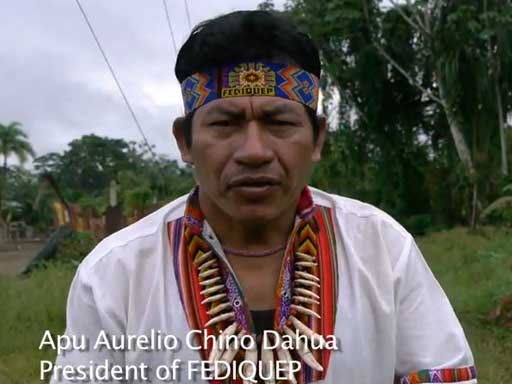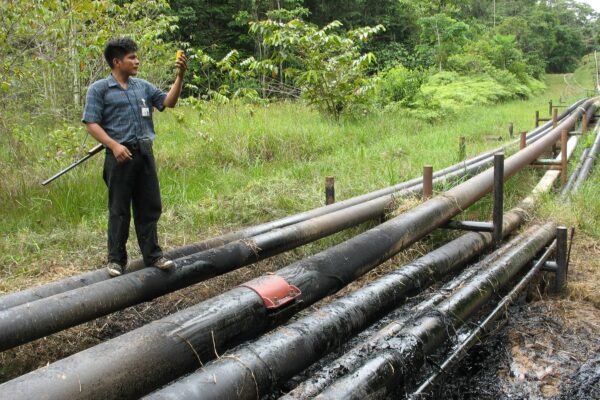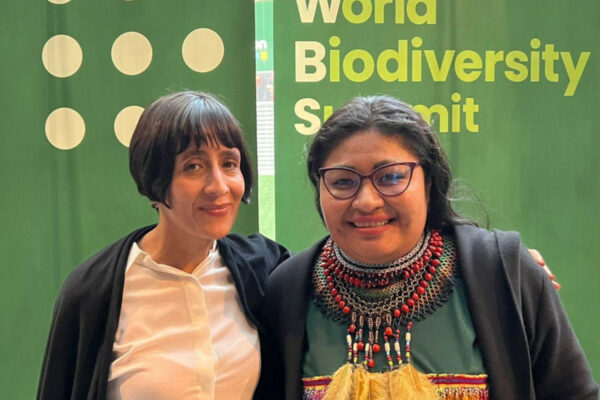On Sunday, Panorama, a primetime Peruvian news program, aired a short documentary on the contamination in the Pastaza Basin caused by Pluspetrol Norte S.A. – Argentinian oil giant and the largest producer of oil in the Peruvian Amazon. Pluspetrol operates the oil concession 192 (former 1AB) and 8, affecting the four river basins Pastaza, Corrientes, Tigre, and the Marañon, in the northern Peruvian Amazon region of Loreto.
Although the images reported in the documentary were shocking, they are not new. The indigenous federations in the affected areas, and its allies, have long been monitoring and broadcasting to the world pictures of crude oil spills, contaminated soils, rivers, and entire lagoons which have been made to disappear by PlusPetrol to cover up contamination. Yet, the testimonies of the Quechua, Achuar, Kukama, Candoshi, among other indigenous groups, have long gone unheard in over forty years of oil exploitation in their territories.

The two pieces of legislation were officially released on March 25th, and beginning yesterday the environmental state of emergency in the Pastaza is now in place. It orders the government to take immediate action to “reduce the risk on the health and the environment in the zones affected by human activities in the Pastaza River Basin.”
These latest developments represent a huge victory, first and foremost for the indigenous Quechua people of the Pastaza and the federation representing them, FEDIQUEP, but also to some of the environmental groups and allies which have been accompanying them. Furthermore, these actions set a precedent for the indigenous groups of the other three affected river basins, who are living in the same conditions.
After a battle that has endured since the seventies, the indigenous federations have increased the pressure significantly on regional and national government in the last few years. For decades, each federation had stood alone against PlusPetrol and their predecessors Occidental Petroleum. However, after a series of important meetings and a forum held in Iquitos in 2011, the federations of the four river basins recognised their shared positions and came together to form a new indigenous movement called PUINAMUDT (Indigenous Peoples of the Amazon United in Defense of their Territories). This was followed by a number of large mobilizations by indigenous groups from across the four rivers, who peacefully protested together against the abuses of PlusPetrol. Following these mobilizations, the government began to listen and dialogue soon opened with PUINAMUDT enabling the federations to finally present their demands and proposals for solutions to the devastating conditions faced by their people.

A multi-sectorial commission was then established in the summer of 2012 which ordered various government bodies to travel to the Pastaza in October 2012 to take soil and water samples for the first time. The results of these tests have now scientifically proven dangerously high levels of contamination which are causing severe health issues in the communities and the environment.
Last week, in a general assembly held in Nuevo Andoas, Aurelio Chino Dahua and the Quechua fiercely demanded that the government urgently declare an environmental state of emergency. Now that this has been confirmed, there is hope that effective measures and actions will finally be taken leading to a cleaner environment, and improved health and living conditions for the people of the Pastaza.
As president of FEDIQUEP, Aurelio Chino Dahua, explained,
“From now on we need the government to completely clean and remediate everything that this company has caused. We are demanding the declaration of state of emergency because we see that the government doesn’t want to attend to our petitions quickly. We are still drinking contaminated water every day… We think that with the declaration of emergency the government will be forced to worry about us and can solve our problem sooner.”
Environment Minister Manuel Pulgar-Vidal said in an interview with RPP News,
“PlusPetrol took over oil exploitation in this zone beginning in 2001, however we know that there has been poor environmental performance by the company. While at one time they carried out a rehabilitation program, this was not done in an adequate manner, and adds to the inadequate actions by the authorities between 2003 and 2005. Actions are now in place to begin permanent and integrated health programs that require the company to rehabilitate the area.”
The minister said that in addition to the Pastaza, from April 15 the government will also be entering the Tigres, Corrientes and upper Maranon Rivers to carry out monitoring work and establish corrective measures.
Of course, the effectiveness of the measures to be adopted by the government during the next three months, and thereafter, is yet to be proven. Nevertheless, it is fair to carefully celebrate the current events as a key victory for indigenous people in the Peruvian Amazon and to hope that the situation now improves after the 40 years of impunity from oil companies.
Alianza Arkana has over the last two years assisted FEDIQUEP in their struggle against PlusPetrol through sustained financial support providing legal representation for the federation as well as reporting directly from the Pastaza delivering their testimonies and developing international awareness.














